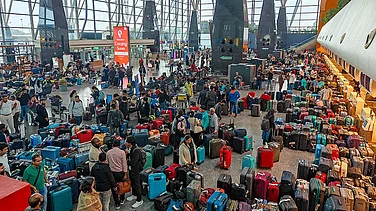In 2016, an actor and his family living in an upscale housing complex in Dahisar, Mumbai, had a nasty experience when vegetarians living in the complex started harassing them over their consumption of animal protein. After a heated confrontation with the actor, their neighbours started leaving dog poop, garbage and other unsavoury stuff at their door. There was an unofficial social boycott of the family. The actor’s school-going son was teased mercilessly about “eating animals”, called a “ghati” (a derogatory reference to Maharashtrians) and not allowed into the play area of the complex. Though the actor filed numerous police complaints, the harassment continued. Finally, fed up with the harassment, they sold the flat and moved on to a housing complex which was open to “non-vegetarians”.
Today, discrimination while renting or selling homes is rampant across the state, specifically in Mumbai. Scores of people are denied houses because they are non-vegetarians. Such food preferences are leading to an extended search for good and affordable accommodation, often without success. Housing complexes—whether swanky high-rises or more modest middle-class ones—have embarked on a silent campaign to turn the cosmopolitan Mumbai into a vegetarian-only zone. Real estate brokers who spoke with Outlook said they have specific instructions to keep away Maharashtrians, Muslims, Backward Castes and other meat-eating people from renting or buying flats. Since a majority of Maharashtrians are meat eaters, finding affordable housing in good complexes has become a herculean task for many.
Inexorably, Maharashtrians are being pushed out to far-flung suburbs to the north of Mumbai, what with redevelopment being pursued on a large scale in areas that were traditionally Maharashtrian pockets adding to the effect of the culinary discrimination. Some, who have been displaced by redevelopment projects, have settled in Valsad, which is all the way up to the Gujarat border.
Vegetarian enclaves in Mumbai are giving the evil eye to meat eaters, who often hide their food preference and claim to be vegetarian in order to avail flats, either on rent or to buy. They then cook non-vegetarian dishes in their new homes, trying to mask the aromas wafting from their kitchens with strong scented incense sticks, loban or dhoop.
Priti Deshmane and her family love mutton. When their tenement in a chawl in Parel went under the redevelopment hammer, unlike many of their neighbours, they did not take the compensation offered by the builder and move to a faraway suburb. Instead, they got a flat in a swanky highrise in 2018, for which they had to pay a part of the price. On being confronted about their food habits, the Deshmanes told the managing committee of the society—comprising vegetarian Gujaratis, Jains and Marwaris—that they too were vegetarians.
ALSO READ: Beef In The Land Of Humans
Back in the chawl, they ate fish or meat on Wednesdays, Fridays and Sundays—and vegetarian fare on other days for religious reasons. Though there is a big fish and meat market in Parel, Priti takes a bus to the Byculla market farther away to buy her family’s quota of fish and meat. This is then wrapped in layers of paper and plastic for its journey home. She sprays the outer side of the plastic bag with sanitiser to mask the smell. “People in the society do not like us as we are not rich. Now I am used to smuggling non-veg food into my house. We can’t order non-veg via home delivery apps as the security guard has been instructed to check the receipt for possible infringement. I light loban, dhoop and agarbattis and keep them outside my door on all days, to avert the suspicion of my neighbours,” says Priti to Outlook. They don’t want to get into a confrontation with their neighbours for the sake of their teenage children, she adds.
ALSO READ: What Ignites Hatred In The Belly?
Even celebrities who eat meat are not spared. Actor Saif Ali Khan had revealed that when he was hunting for houses in 2012 after his marriage to Kareena Kapoor, he was turned away by many housing societies. In November 2014, actor Emraan Hashmi too aired a similar complaint—that a housing society for the well-heeled had turned him down. In May 2015, Vaishnav Rane, an engineer, wanted to book a 1-BHK flat for his sister in an under-construction high-rise in Malad (East)—a suburb to the north of Mumbai. He was told the flats were specifically meant for Gujaratis, Jains and Marwaris. Maharashtrians, Muslims and those from Backward Communities would not be allowed to buy flats, he was informed.
ALSO READ: Caste On A Platter: Food For Dalits
There is a lack of political will to weed out this problem from the roots, say many of those who spoke to Outlook. Behind the recent drive to deny accommodation to meat eaters is reportedly an influential builder, an MLA of a national party. Even restaurants with fish and meat on the menu are not allowed to set up shop in the areas that fall within his assembly constituency.
Govardhan Deshmukh of the NGO Marathi Ekikaran Samiti (MES) is leading the fightback against this rising discrimination over food preferences. Speaking to Outlook, Deshmukh said he too has been a victim. “It was October 2021. I was looking for a flat, saw an advertisement on Facebook for one in Mira Road, and contacted the owner. He told me the society had specifically instructed him not to sell his flat to Maharashtrians, Muslims and people from communities who are known to eat meat. I filed a complaint at the Mira Road police station,” says Deshmukh.
ALSO READ: Mid-Day Meal Scheme: We Need No Politics
But, he says, the police were initially not keen on registering his complaint. They finally registered a non-cognisable offence after making him sit at the police station for six hours. Because of Deshmukh’s tenacity, the police called the chairman and secretary of the society, as well as the flat seller. “The management denied they had put any such condition. The seller was arrested, but later released on bail. To date, neither has a chargesheet been filed, nor has the matter moved forward,” says Deshmukh.
The MES has started collating data on this discriminatory practice from across Maharashtra. “Gujarati, Jain and Marwari builders are using their vast resources to buy huge tracts of land in Mumbai and other parts of Maharashtra. They then build a Jain or Gujarati temple in the premises of housing societies they build, as casus belli to pre-empt sale of flats to meat eaters,” says Deshmukh.
Santosh Dhuri of the Maharashtra Navnirman Sena (MNS), too, claims he was denied accommodation in a housing complex in Goregaon in 2016. Then a corporator, he wanted to buy a 2-BHK flat, but was told that since he was a meat-eating Maharashtrian, there were no flats available in the ‘Gujarati only’ complex. He had then filed a complaint against the builder, but the case is yet to move forward.
ALSO READ: A Pandit Must Know His Meat
Over a decade ago, residents of a ‘vegetarian zone’ in Chembur prevented an eatery selling kebabs to be set up in the area, arguing that a non-vegetarian eatery—even if were set up on the road—would attract the “wrong crowd”.
Across Mumbai and Maharashtra, a majority of schools, including expensive private English-medium ones, have implemented an unofficial “no-meat” tiffin policy on students for a while. A traumatic experience killed lawyer Jayshree Mohandas’s belief that Mumbai is a city of “open-minded” people. “One day, I gave my daughter an egg sandwich as tiffin. I was called to school and categorically told by the class teacher to only send vegetarian food. My child was in tears and traumatised. She was ostracised, and friends stopped talking to her. I had to change her school because she refused to return to her old school,” says Mohandas.
ALSO READ: Mise En Place for Mise-En-Scène
Across Mumbai, vegetarianism is considered a USP in the real estate industry, and has become a bullying exercise, say many. On November 27, 2014, the Brihanmumbai Municipal Corporation (BMC) passed a resolution stating that the civic body should stay the construction of any residential project if a builder refuses to sell flats on food preferences, caste or religion. But since builders do not give in writing that they are selling flats only to vegetarians, it is difficult for victims to file complaints, says Deshmukh. The numbers of those who have been discriminated against is large, yet, the fear of social boycott by neighbours within a housing complex deters many from talking about their experience. “We have learnt to live with it,” said Suresh Bhoite, a marketing professional at a media group. “My daughter has turned vegetarian. She says it will be easy to live with others now,” says Bhoite.
No political party in Maharashtra has seriously taken up this issue. Even the MNS has been less than sincere on the topic. The BJP of course has stayed clear of addressing the issue, as a large chunk of Gujaratis, Jains and Marwaris are their traditional vote bank. According to sources, the discrimination has increased manifold since the BJP cornered the chief ministerial post in the state for the first time in 2014. This is the period when this discrimination spread from Mumbai to Pune, Nasik, Thane and Nagpur.
According to a sitting judge of the Bombay high court, there is no legal provision that allows members of a majority community in a cooperative housing society to impose their food preferences on others. “In case something like this takes place it is a violation of the fundamental right to choose one’s own food,” said the judge to Outlook.
The roots of the problem can be traced all the way back to the 1980s, when there was a real estate boom in Mumbai. Suddenly, “vegetarian only” housing projects began mushrooming in Parel, Lalbaug, Ghatkopar, Goregaon, Mulund, Vile Parle, Malabar Hill, Byculla, Mazgaon, Borivali, Malad and Goregaon. Today, areas such as Bandra, Khar, Nana Chowk, Juhu Scheme, Teen Batti, Walkeshwar, Napean Sea Road, Dadar, Girgaum etc., have succumbed to the silent rule, forbidding non-vegetarians from buying homes in societies.
Housing societies regularly use the No Objection Certificate (NOC) that flat-owners have to seek from the society management before leasing or selling their flats to dictate terms to flat owners about whom to sell or rent their properties. But Section 23 of the Maharashtra Cooperative Societies Act, 1960, states that housing societies cannot discriminate against a person over their food preference, religion or caste. Earlier this month, Maharashtra housing minister Jitendra Awhad tweeted to reiterate that flat-owners who wanted to lease out or sell their flats do not need any NOC from the society management, as it increased hatred. But prospective customers remain unconvinced.
(This appeared in the print edition as "‘Non-vegetarians Not Allowed Here’")
Haima Deshpande in Mumbai






















